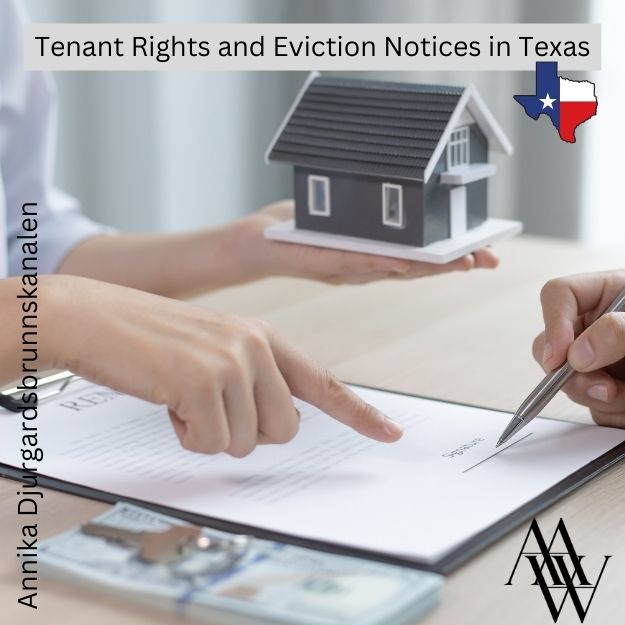Navigating the complexities of leasing real estate in Texas requires a comprehensive understanding of both landlord and tenant rights. As attorneys, it’s crucial to guide clients—whether landlords or tenants—through the intricacies of leases, tenant rights, and the legalities of eviction. This article aims to shed light on these topics, providing a detailed overview for Texas attorneys.

Lease Agreements: The Foundation of Tenant Rights
A lease agreement is a binding contract between the landlord and the tenant, outlining the terms and conditions of the rental arrangement. In Texas, leases can be oral or written, but written agreements are preferable as they provide clear documentation of the terms. Key elements of a lease include:
- Identification of Parties: Names of the landlord and tenant.
- Property Description: Address and description of the rental property.
- Lease Term: Duration of the lease, whether it’s a fixed-term or month-to-month.
- Rent Amount and Due Date: Specifying the amount of rent, due dates, and any late fees.
- Security Deposit: Amount, purpose, and conditions for its return.
- Maintenance and Repairs: Responsibilities for property upkeep.
- Pet Policies, Utilities, and Other Rules: Any additional rules specific to the property.
Understanding these components helps ensure that the rights and obligations of both parties are clearly defined, reducing potential disputes.
Tenant Rights in Texas
Tenants in Texas are afforded various rights under state and federal laws. These rights ensure tenants have a safe and habitable living environment and protect them from unfair practices. Key tenant rights include:
1. Right to a Habitable Home
Texas law mandates that landlords must provide habitable housing, which means the rental property must meet basic health and safety standards. This includes functioning plumbing, heating, and electrical systems, as well as proper sanitation facilities. If a landlord fails to make necessary repairs, tenants have the right to:
- Request Repairs: Tenants can request repairs in writing.
- Repair and Deduct: If the landlord fails to address critical repairs, tenants may, under certain conditions, arrange for repairs and deduct the cost from the rent.
- Terminate the Lease: In extreme cases, tenants may terminate the lease if the property is uninhabitable.
2. Right to Privacy
Tenants have a right to privacy in their rental home. While landlords can enter the property for repairs or inspections, they must provide reasonable notice, typically 24 hours, unless it’s an emergency.
3. Protection from Discrimination
Under the Fair Housing Act, tenants are protected from discrimination based on race, color, national origin, religion, sex, familial status, or disability. In Texas, additional protections may apply under state laws.
4. Security Deposit Protections
Texas law regulates how landlords must handle security deposits. Key protections include:
- Return of Deposit: Landlords must return the security deposit within 30 days after the tenant moves out.
- Deductions: Landlords can only deduct for damages beyond normal wear and tear or unpaid rent, and must provide an itemized list of deductions if any part of the deposit is withheld.
5. Right to Fair Eviction Procedures
Eviction is a legal process and must follow specific procedures to ensure tenants’ rights are protected. This brings us to the critical issue of eviction notices.
Eviction Notices and Procedures
Eviction is one of the most contentious issues in landlord-tenant relationships. In Texas, the eviction process must adhere to strict legal guidelines to be valid.
1. Grounds for Eviction
Common grounds for eviction include:
- Nonpayment of Rent: The most frequent reason for eviction.
- Violation of Lease Terms: Such as unauthorized pets, illegal activity, or excessive noise.
- Holdover Tenants: Staying beyond the lease term without the landlord’s consent.
2. Notice Requirements
Before filing for eviction, landlords must provide tenants with a written notice to vacate. The notice period depends on the reason for eviction:
- Nonpayment of Rent: A minimum of three days’ notice is required unless the lease specifies a different period.
- Violation of Lease Terms: Typically, a three-day notice, but the lease may dictate otherwise.
- No Reason (Month-to-Month Tenancy): Landlords must give at least 30 days’ notice if terminating a month-to-month tenancy without cause.
3. Filing for Eviction
If the tenant does not vacate after the notice period, the landlord can file an eviction lawsuit (forcible detainer suit) in the Justice of the Peace court in the precinct where the property is located.
4. Court Proceedings
The tenant will receive a citation and has the right to a hearing. During the hearing, both parties can present their case. If the court rules in favor of the landlord, a judgment for possession will be issued.
5. Writ of Possession
If the tenant still refuses to leave, the landlord can request a writ of possession, allowing a constable to remove the tenant and their belongings from the property.
Legal Assistance for Landlords and Tenants
Given the complexities of landlord-tenant law, both parties often need legal guidance. Attorneys play a crucial role in:
- Drafting and Reviewing Leases: Ensuring all terms are clear and lawful.
- Resolving Disputes: Mediating conflicts to avoid litigation.
- Navigating Evictions: Ensuring all legal procedures are followed to protect clients’ rights.
Conclusion
Understanding tenant rights and the eviction process is essential for both landlords and tenants in Texas. Attorneys must be well-versed in these areas to provide effective counsel and representation. By ensuring that lease agreements are fair and legally sound, and by guiding clients through the proper legal channels, attorneys can help maintain the delicate balance between protecting tenant rights and upholding landlord interests.
This overview provides a foundational understanding for Texas attorneys dealing with real estate leasing and tenant rights. Staying informed about updates in state laws and local ordinances is crucial for providing accurate and effective legal advice.